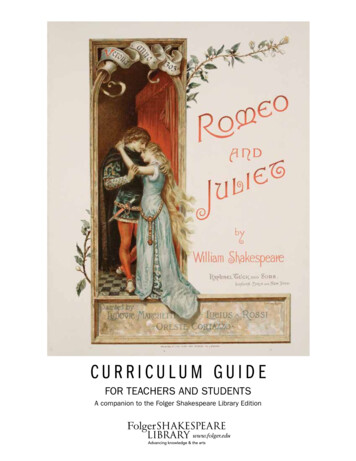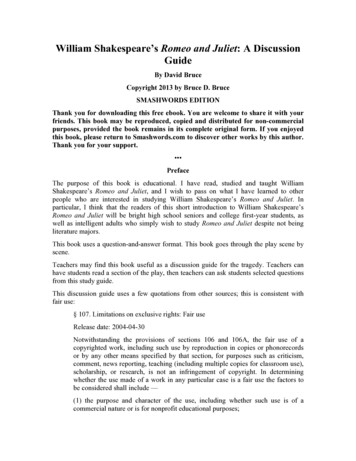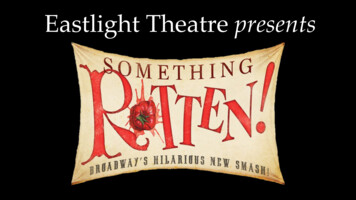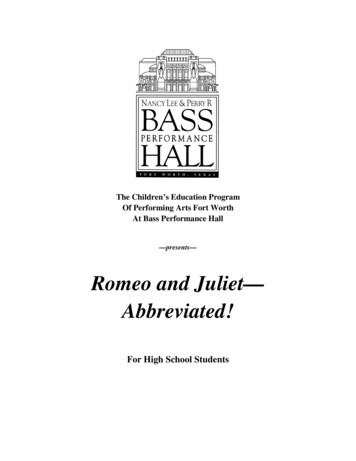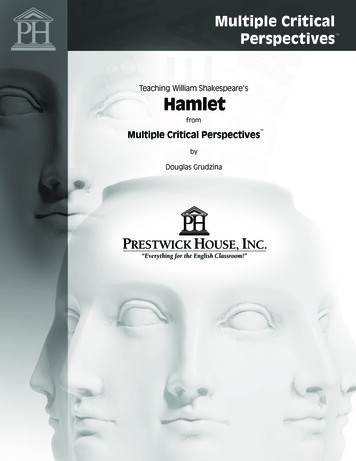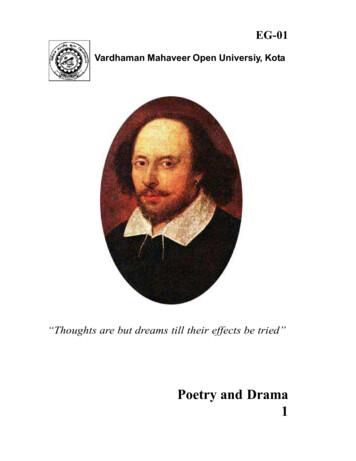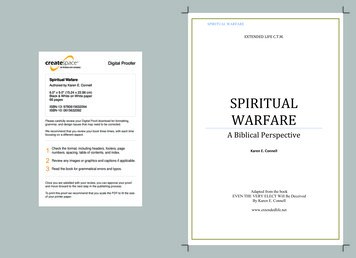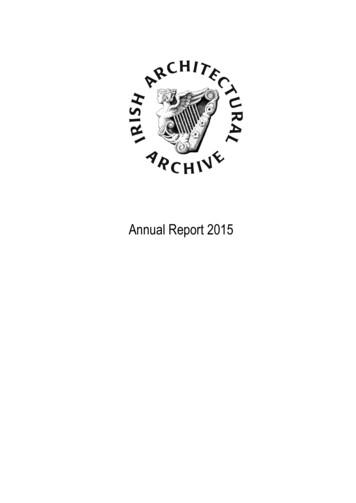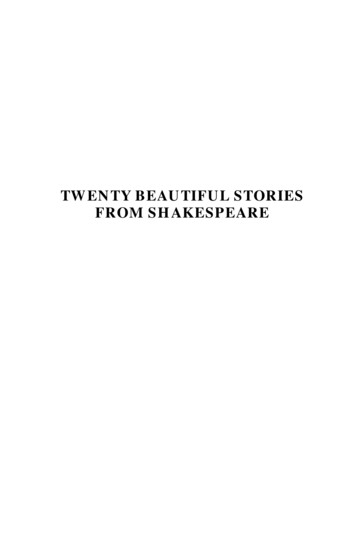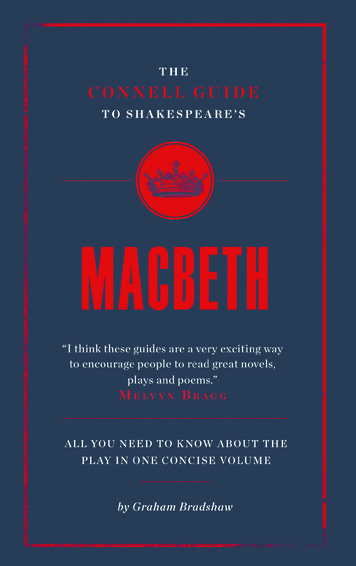
Transcription
TheConnell GuidetoShakespeare’sMacbethbyGraham Bradshaw
ContentsIntroduction4A summary of the plot6What is Macbeth about?10How does Shakespeare createan atmosphere of evil?20Is Macbeth the plaything of a giantmalevolence?25How sympathetic do we feelto Macbeth?31So what of the play’s final scene?Is it or isn’t it triumphal?101Is life a tale “told by an idiot/Signifying nothing”?108N OT E SThe charactersSupernatural powers714Persecuting witches27Babes32The Porter44Historical inaccuracies52Why is the relatively uneducatedMacbeth’s language so difficult?43Ten facts about Macbeth64The Weird Sisters68Is Duncan a saintly king?50Inventing Banquo70How good a man is Banquo?62The poetry in Macbeth82The “sweet milk of concord”91Macbeth’s “borrow’d robes”98How close is theMacbeths’ marriage?76Christian imagery in Macbeth108Bibliography120What happens to the marriage?81A short chronology122Is Macduff this play’s real hero?89
IntroductionEven now, whenever I read Macbeth, I cannotforget the terror I felt when I first read it as aneight-year-old boy in Brazil who was certainly noswot, and read anything he could get hold of,including the notorious American horror comicsthat were banned in Britain and many othercountries. The comics were frightening, in theirlurid way. But the first act of Macbeth seemed like afar more dreadful imaginative summons. I stillremember the shock of realizing that blood mustreek, or have a smell, and that in Scotland, whichmust be a very cold country, bloody swords wouldsmoke. I remember my shuddering horror when Iguessed, with the help of the word “unseam”, justwhat it was that Macbeth was doing toMacdonwald when he ripped him open from thenave to the chops – and my incredulity whenDuncan’s response was to call this disembowellerof rebels a “Worthy gentleman”! Was the King ofScotland even listening to the terrifying reportfrom the bleeding Captain?Macbeth may well be the most terrifying play inthe English language, but it hasn’t always been seenthat way. It has divided critics more deeply than anyother Shakespearian tragedy – and the argument,in essence, has been about just how terrifying theplay really is and about how we should react, or doreact, to Macbeth himself. No Shakespearian4tragedy gives as much attention to its hero asMacbeth. With the exception of Lady Macbeth,there is much less emphasis on the figures roundthe hero than there is in Hamlet or Othello. UnlikeKing Lear, with its parallel story of Gloucester andhis sons, Macbeth has no sub-plot. There is littlecomedy, so little that many find the porter’s scene,the one exception, a jarring addition to the play.And its imagery of sharp contrasts – of day andnight, light and dark, innocent life and murder –adds to the almost claustrophobic intensity of thismost intense of plays.So why are critics so divided about Macbeth?Why is it such a disturbing play? Why do we feelcompelled to admire its hero even as we condemnhim? How reassuring is the last scene, whenMacbeth is killed and Malcolm becomes king? Dowe see this as the intervention of a divineprovidence, a restoration of goodness after all theevil? Or do we see little evidence of divineprovidence and instead signs that the whole cycleof violence and murder could be about to begin allover again? And what does the play really tell usabout good and evil? This book sets out to answerthese questions, and to show how it is only in recentyears that the extent of Shakespeare’s achievementin Macbeth, and the nature of his vision in the play,has really been grasped.5
A summary of the plotAct OneThe play opens in thunder and lightning withThree Witches chanting round a boiling cauldron.A wounded sergeant reports to King Duncan thathis generals – Macbeth and Banquo – havedefeated the allied forces of Norway and Ireland,led by the traitor Macdonwald. Macbeth andBanquo, wandering on a heath after their victory,meet the Three Witches, who greet them withprophecies. The first witch hails Macbeth as“Thane of Glamis” (his title), the second as“Thane of Cawdor”; the third proclaims he shall“be King hereafter”. The witches tell Banquo hewill father a line of kings. When they vanish, amessenger arrives from the King, informingMacbeth he is now to be Thane of Cawdor.Macbeth begins to ponder how he can achieve thefinal prophecy, and become King. When Duncanarrives to stay at the Macbeths’ castle atInverness, Lady Macbeth hatches a plan tomurder him and secure the throne for herhusband. Macbeth agonises, but Lady Macbetheventually persuades him.Act TwoMacbeth hallucinates before entering Duncan’squarters to commit the murder, believing he sees abloody dagger. After the murder he is so shaken6that Lady Macbeth takes charge, framingDuncan’s sleeping servants, as she has plannedto do, by placing bloody daggers in their hands.The next morning, Macduff arrives and discoversDuncan’s corpse. Feigning anger, Macbethmurders the guards before they can protest theirinnocence. Macduff is suspicious of Macbeth,but does not reveal his suspicions publicly.Fearing for their lives, Duncan’s sons flee,Malcolm to England, Donalbain to Ireland.Macbeth assumes the throne after being electedthe new King of Scotland.Act ThreeMacbeth is uneasy about Banquo, and thewitches’ prophecy which predicts he will fathera line of kings. He hires two men to kill Banquoand his young son, Fleance. The assassinssucceed in killing Banquo, but Fleance escapes. Ata royal banquet afterwards, Banquo’s ghost entersand sits in Macbeth’s place. Macbeth flies into arage; a desperate Lady Macbeth tells her gueststhat her husband is unwell. The ghost departs butwhen he returns a second time, prompting anotherdisplay of anger from Macbeth, the thanes flee.Act FourMacbeth visits the Three Witches again. Theyconjure up spirits: an armed head warns him to“beware Macduff”; another spirit, a bloody child,7
says “none of woman born/ shall harm Macbeth”;a third, a crowned child, says Macbeth will “nevervanquish’d be until/Great Birnam Wood to highDunsinane Hill/shall come against him”. Macbethis told by Lennox, one of the Scottish nobles, thatMacduff is in exile in England. Despite this, hesends murderers to Macduff’s castle where theykill Macduff’s wife and their young son. In thelong, so-called English scene, Macduff (as yetignorant of the deaths) is tested by Malcolm, whois finally convinced of his “truth and honour”.Immediately after this, Macduff learns that hiswife and son have been murdered.Act FiveLady Macbeth, now wracked with guilt,sleepwalks, trying to wash imaginary bloodstainsfrom her hands. As the English army approaches,led by Malcolm, Macbeth learns that many of histhanes are deserting him. While encamped inBirnam Wood, the English soldiers are ordered tocut down branches from trees and to carry them ascamouflage, fulfilling the witches’ prophecy.Macbeth delivers a final despairing soliloquy onlearning that his wife has died. (The cause isundisclosed but Malcolm later suggests she hascommitted suicide.)In the ensuing battle, Macbeth confrontsMacduff, saying that he cannot be killed by anyman born of woman. But Macduff declares that he8was “from his mother’s womb/ Untimely ripp’d”.Macduff beheads Macbeth offstage and the playends with Malcom accepting the throne.THE CHARACTERSDUNCAN, King of ScotlandMALCOLM, Duncan’s sonDONALBAIN, Duncan’s sonMACBETH, a general in the King’s army, later kingBANQUO, a generalMACDUFF, LENNOX, ROSS , MENTEITH,ANGUS , CAITHNESS , nobleman of ScotlandFLEANCE, Banquo’s sonSIWARD, Earl of NorthumberlandYOUNG SIWARD, Siward’s sonSETON, personal officer to MacbethMACDUFF’S SONLADY MACBETHLADY MACDUFFAn English Doctor, A Scottish Doctor, A Sergeant, A Porter,An Old Man, Three Murderers, A Lady-in-waiting, ThreeWitches, Hecate, Apparitions, Lords, Gentlemen, Officers,Soldiers, Attendants and Messengers9
What is Macbeth about?The orthodox or traditional idea is that Macbeth isnot only a study of “ambition” but a study of “evil”.The director Peter Hall described it in a 1970interview as “the most thorough-going study ofevil that I know in dramatic literature”:Evil in every sense: cosmic sickness, personalsickness, personal neurosis, the consequence ofsin, the experience of sin, blood leading to moreblood, and that, in a way, leading inevitably toregeneration. Disease or crime, or evil, inducesdeath, which induces life. Macbeth presents thiscycle of living and, in that sense, I find it the mostmetaphysical of Shakespeare’s plays – anunblinking look at the nature of evil in the personand in the state, and in the cosmos.One would naturally expect such a play to beterrifying, but in the kind of “cycle” Hall soeloquently describes there is light at the end of theterrible tunnel. Evil “induces death, which induceslife” and leads “inevitably to regeneration” and aprovidential restoration of “Order” – the orderthat Macbeth destroyed by killing Duncan, the‘Holy King’.Through most of the 20th century, thedominant view concurred with Sir Peter Hall’s: theplay’s terrors, while alarming, are safely contained;10Evil is finally exorcized by the triumph of Good.This idea of a reassuringly inevitable orprovidential intervention was rather like, or all toolike, Victor Hugo’s Romantic view of the reasonsfor Napoleon’s downfall:The moment had come for supreme incorruptiblejustice to intervene. Napoleon had beendenounced in infinity, and his fall had beendecided. He was in God’s way.Here it’s worth recalling two accounts of Macbeththat impressed me when I was a schoolboy. One isJohn Danby’s book, Shakespeare’s Doctrine ofNature (1949), in which Danby compares the“formal outline” of Macbeth to the shape of theyoung Shakespeare’s first historical tetralogy –the three Parts of Henry VI, and Richard III. Inthis sequence of plays, says Danby, a Holy King iskilled by a murderer who is then forced to rule“with blood and iron, proceeding from enormityto enormity”, until, finally, “the powers ofoutraged pity and justice” return to overthrow themurderer. Danby’s assumption is that Macbeth hasa similar moral and even religious framework, aframework in which, once again, “the powers ofpity and justice” come out on top, this time in atriumphal last scene in which Macbeth is killed,his forces are routed and Malcolm succeeds tothe throne.11
L.C. Knights’s earlier and very influentialaccount of Macbeth in Explorations (1946) wenteven further in insisting on the firmness of theplay’s “positive values”. For Knights, the “maintheme of the reversal of values is given out simplyand clearly in the first scene — ‘fair is foul and foulis fair’; and with it are associated premonitions ofthe conflict, disorder and moral darkness intowhich Macbeth will plunge himself”. But thissituation was, to borrow the Viennese saying,“desperate but not serious”, since the disorder anddarkness were safely contained. “Well before theend of the first act,” Knights assures us, we are “inpossession” of those “positive values against whichthe Macbeth evil will be defined”.Knights writes as though these “positive values”are not only there “in” the play, as part of what weare to suppose people at that time all believed, ina world we have lost: they are also grounded inthe inherent structure of reality in the world weall inhabit.It is only in the last 50 years or so that criticshave seriously begun to challenge the sort ofpositive, providentialist view of Macbeth espousedby critics like Danby, Knights and, up to a point atleast, Peter Hall. In his pioneering 1963 essay on“The ‘Strong Pessimism’ of Macbeth”, WilburSanders protested against all those “readings ofMacbeth in which evil is somehow subordinated tothe good and to the natural, and the military12victory of Malcolm’s forces is seen as theelimination of the Macbeth-evil”: “this kindof simplification”, Sanders observed,“domesticates the play and draws its teeth”. Inanother, not so early but resonant 1980 essay thatwas reprinted in his magnificent collection MakingTrifles of Terrors, Harry Berger Jr. protested thatthe natural or even sacred “Order” that providedthe assumptive basis for providentialist readingswas not conspicuously present – or was nowhere tobe found – in the play’s opening scenes. ArthurKinney echoed this protest at the start of his bookLies Like Truth (2001).The opening scenes, after all, are capable of amuch more alarming interpretation thantraditional critics allow. Take the sinister coupletthat concludes the unforgettable but astonishinglybrief (15 line) first scene:Fair is foul, and foul is fair,Hover through the fog and filthy air –Providentialists take the witches’s words to meanthat we are about to witness a reversal or inversionof ordered Nature, where all we need to do, as inBen Jonson’s Volpone, is turn things the right wayup and order will be restored. But the morealarming possibility is that the witches aremocking or repudiating the very idea of someontological and moral difference between “fair”13
and “foul” – and suggesting there is no absolutedifference between them, indeed that there are noabsolute values at all.Moments earlier, the witches say they haddetermined to meet MacbethWhen the hurly-burly’s done,When the battle’s lost and won.Again, we can rationalize the reference to “Whenthe battle’s lost and won”: the winner’s victory willbe the opponent’s loss. But again there is another,more frightening possibility: that winning is reallyjust losing more slowly – an interpretation thatanticipates Macbeth’s final nihilistic vision of lifeitself as a tale “Told by an idiot”: “Full of soundSUPERNATURAL POWERSThe witches’ oracularpredictions to Macbethcome true, and of coursethey know where and whento find him. That some oftheir prophecies to Banquostill haven’t been confirmed14when the play endscontributes to theuneasiness in the final scene:where, Bertolt Brechtwanted to know, is Fleance?We expect prophecies andpredictions in works of art tocome true, like theSoothsayer’s prediction inJulius Caesar; that is usuallywhy they are there. So weshouldn’t conclude tooquickly that the WeirdSisters must be “real”witches, and therefore mustbe instruments of Satan, andand fury” but “Signifying nothing”. In thisinterpretation, the moral categories – Knights’s“positive values”, and all distinctions betweenfair and foul, or good and evil, or losing andwinning – threaten to disappear into the “fogand filthy air”.In the light of this, it is unsurprising thatLafew’s deeply sceptical remarks in All’s WellThat Ends Well about how fragile our assumptionsare and how little we know of the world have beencited more than once as appropriate to the moodof Macbeth:They say miracles are past; and we have ourphilosophical persons, to make modern andfamiliar, things supernatural and causeless.that the Christian God musttherefore be in his Heaven,so that all may soon be well.References to thesupernatural are morefrequent in Macbeth than inany other Shakespeare playexcept Julius Caesar.Banquo appeals to the“merciful powers” to“Restrain in me the cursèdthoughts that nature/ Givesway to in repose”; but hedoesn’t know how strongthese powers are, and he isafraid to go to sleep. LadyMacbeth appeals to the“spirits” that “tend on mortalthoughts” to “unsex mehere”, but we don’t knowwhether these spirits comewhen they are called; in thatcase the actress and directorhave to decide whether tosuggest that there is someimmediate, fataltranformation. In this play,the “powers” that appear tobe ranged against each otherin the opposed worlds of Dayand Night remainmysterious and uncertain. 15
Hence is it that we make trifles of terrors,ensconsing ourselves into seeming knowledge,when we should submit ourselves to anunknown fear.These words provided Wilbur Sanders with anepitaph for his essay “An unknown fear” and HarryBerger with the title for his book (Making Triflesof Terrors). Set Lafew’s humbling fear of how littlewe know – or Hamlet’s “There are more things inheaven and earth, Horatio, than are dreamt of inour philosophy” – against Victor Hugo’s flatulentromantic optimism about why Napoleon’sdownfall was inevitable, and you have a prettygood idea of the gulf between modern andtraditional views of Macbeth.Nor is our attitude to the central character asstraightforward as many critics would have usbelieve. Although we witness his terribledegeneration, he is also the most sensitive andsympathetic character in the play. In L.C. Knights’sprovidentialist view, we “see through” Macbeth inmuch the same way that we see through aconfidence trickster, or a bad argument: hebecomes a tyrant who shrinks in stature during theplay. Yet we also “see through” him in quite adifferent sense, seeing his world through his eyes,through his asides and soliloquies, his torturedOpposite: poster for Orson Welles’s 1948 film16
sense that “Nothing is, but what is not” and – thishad better be said too –his sometimesastonishingly difficult language. For in a muchmore alarming way he actually grows in stature:the Macbeth we see in the earliest scenes is anervous wreck who becomes ever more fearless inthe fascinated way he watches and reports on hisown terrible inner transformation. As StephenBooth puts it in one of the finest discussions of thisplay, “to be audience to Macbeth is virtually to beMacbeth for the duration of the performance”.The tragedy, Booth suggests, occurs not so muchon stage as “in the audience”; Shakespeare makesus join our minds to Macbeth’s both in “his[Macbeth’s] sensitive awareness of evil and hispractice of it”.Despite the horror we feel for his increasinglymonstrous behaviour, we find ourselves forcedto admire as well as to condemn his extraordinaryvitality and daring. He is a force of nature and,as Wilbur Sanders suggests, his defiant energyrepresents, even exemplifies, something whichNietsche and D. H. Lawrence both took to bea vital and essential element of human existence.his conception of evil an awareness of dynamismand power.Sanders goes on to quote Henry V:There is some soul of goodness in things evilWould men observingly distil it out.Macbeth is an unsettling play. It is unsettling in theway we are made to see its central figure both as avillain who commits horrifying deeds but also as ahero who compels our admiration. And it isunsettling because it not only suggests that evil is astronger force than good but questions the wholeidea of some absolute standard of goodness againstwhich everything can be measured. Like KingLear, it confronts the possibility that we live in anunaccommodating universe where the very idea ofexternal “order” is an illusion. This is a play, toadapt the bleeding captain’s words in the secondscene, where “discomfort” keeps “swelling” fromevery “seeming comfort”, and the “multiplyingvillainies of Nature” seem omnipresent and readyto swarm through any breach.It is as if the Shakespeare who knew that themeek must, and do, inherit the earth, also sawfrom a different point of view (Nietzschean,Lawrencian) what a disaster it would be for theearth if they did, and preserved at the very core of1819
How does Shakespearecreate an atmosphere ofevil?What bears in on us in the opening scenes ofMacbeth is something terrifyingly inchoate. A. P.Rossiter, usually a scrupulously attentive critic,refers to the “breakdown of ordered nature” whichis “released by Duncan’s murder”, but what onearth does he mean? How can he speak of a“breakdown” which is only “released” in thesecond act, when the play (after its short prologue)starts with with the description of a bloody battle– described as “another Golgotha” (massacre) – inwhich Nature’s “multiplying villainies” are already“swarming”?And when, once Duncan’s murder has takenplace, Macbeth reflects that he might be better offdead, his miniature sketch of Duncan’s reignscarcely suggests that it was a period of peace andorder:After life’s fitful fever he sleeps well,Treason has done his worst; nor steel, nor poison,Malice domestic, foreign levy, nothing,Can touch him further. [3.2]What is so disturbing about Act One is not thesense of evil events disrupting a stable, morally20clear world but the absence of any such world. Theatmosphere of the opening scenes is one ofcontinual “Hurly-burly”, where “fair is foule andfoule is fair” – words spoken by the witches andthen eerily echoed by Macbeth when he firstappears. As Arthur Kinney points out in Lies LikeTruth, the first four scenes all begin with questions:“When shall we three meete again?”; “Whatbloody man is that?”; “Where has thou beene,sister?”; “Is execution done on Cawdor?” and theplay thereafter resounds with questions: “If weshould faile?”; “Is this a Dagger, which I see beforeme ?”; ”But wherefore could I not pronounceAmen?”The questions help establish the play’sunsettling atmosphere, as do the tales and acts ofviolence, threats, hallucinations, charms,conjurations and secret plotting. Macbeth is a“play of conspiracies”, says Kinney; from the firstscene when the witches conspire with each otherwe have one conspiracy after another:of Macbeth and the witches with their foreseentitles; of Macbeth and his wife; of Macbeth andBanquo complicit in silence; of Macbeth andLennox, who supports his story at the discovery insilence; of Macbeth and Ross as he interrogatesothers and discovers Macduff’s flight.The play is full, too, of rumours and mysteries.21
“Surprise is continual,” writes G. Wilson Knight:Macbeth does not understand how he can beThane of Cawdor (1.3). Lady Macbeth is startledat the news of Duncan’s visit (1.5); Duncan at thefact of Macbeth’s arrival before himself (1.6).There is the general amazement at the murder; ofLennox, Ross and the Old Man at the strangehappenings in earth and heaven on the night ofthe murder (2.3; 2.4). Banquo and Fleance areunsure of the hour (2.1). No one is sure ofMacduff’s mysterious movements. Lady Macbethis baffled by Macbeth’s enigmatic hints as to the“deed of dreadful note” (3.2). The two murderersare not certain as to whom has wronged them,Macbeth or Banquo (3.1); they do not understandthe advent of the “third murderer” (3.3). Rossand Lady Macduff are at a loss as to Macduff’sflight, and warning is brought to Lady Macduff bya mysterious messenger who “is not by herknown” (4.2). Malcolm suspects Macduff,and there is a long dialogue due to his “doubts”(4.3); and in the same scene Malcolm recognizesRoss as his countryman yet strangely “knowshim not” (4.3).The questions and the mysteries reinforce thesense of a lack of order and the contradictoryimpressions the play produces in us which makeus feel that22.we feare, yet know not what we feare,But floate upon a wilde and violent SeaEach way, and none. [4.2]Following the witches on the heath, the play’ssecond scene gives us our first real sense of thesituation from which the play’s events will unfold.We hear from the Captain his description of thebattle in which Macbeth fights Macdonwald. The“brave” and (for now) good Macbeth defeats andkills the “mercilesse” and bad Macdonwald, but, ashas often been remarked, the Captain’s descriptionof a “doubtful” conflict between “two spentSwimmers” who “cling together,/And choake theirArt” makes the two men seem indistinguishable,while the Captain’s attempt to provide adistinction by calling one “mercilesse” and theother “brave” is itself exposed by theinterchangeability of the adjectives: it is hard tothink the unseamer more merciful than the manhe unseams.Doubtful it stood,As two spent swimmers that do cling togetherAnd choke their art. The merciless Macdonwald(Worthy to be a rebel, for to thatThe multiplying villainies of natureDo swarm upon him) from the Western IslesOf kerns and gallowglasses is supplied;And Fortune, on his damned quarrel smiling,23
Showed like a rebel’s whore. But all’s too weak:For brave Macbeth (well he deserves that name),Disdaining Fortune, with his brandished steel,Which smoked with bloody execution,Like valor’s minion carved out his passageTill he faced the slave;Which ne’er shook hands nor bade farewell tohimTill he unseamed him from the nave to th’ chopsAnd fixed his head upon our battlements. [1.2]As the American critic Stephen Booth has pointedout in a brilliant analysis of this speech in KingLear, Macbeth, Indefinition and Tragedy, Macbethcomes across as “impersonal, ruthless andviolent”; he may be “the defender of right” but hesounds “more a monster of cruelty thanMacdonwald does”. Throughout the Captain’snarrative, indeed, “the doers of good sound eitherlike or worse than the evildoers”. And what is trueof the Captain’s narrative is true of the play as awhole: the sense of evil always seems muchstronger to us than the sense of good. The outcomeof the “doubtful” conflicts described appears todepend on chance and Macbeth’s Might, not onRight, or any providential power.Is Macbeth the plaything ofa giant malevolence?The first mystery in this play full of mysteriesis, of course, the nature of the witches. Who arethey? Are they natural or supernatural, real orimaginary? In a sense, as Stephen Booth observes,they are more real to us than anyone else in theplay because they are the first characters we meet.In effect, we see all the subsequent action throughtheir prophecies to Macbeth (that he will becomeThane of Cawdor, then King of Scotland) andBanquo (that his children will become kings).In trying to understand who they are,Banquo’s amazed response when he first seesthem is important:What are these,So withered, and so wild in their attire,That look not like th’inhabitants o’th’earthAnd yet are on’t? [1.3]Banquo then addresses and questions the strangecreatures, while providing further descriptivedetails:Live you, or are you aughtThat man may question? You seem tounderstand me,2425
By each at once her choppy finger layingUpon her skinny lips. You should be women,And yet your beards forbid me to interpretThat you are so.Macbeth himself then asks, more crisply: “Speakif you can: what are you?” In the period after theRestoration when the witches were routinelytrivialised and often wore conical hats, thisquestion would have seemed stupid rather thantroubled. But Shakespeare’s witches are moremysterious, more frighteningly ambivalent.As the respected actor, director, critic anddramatist Harley Granville-Barker noted in hisPrefaces to Shakespeare (1927-54), the witchesare never actually called witches in the play.They are called the Weird Sisters. A.C. Bradleyalways referred to them as witches, though heinsisted that they are not, “in any sense whatever,supernatural beings”: “They are old women,poor and ragged, skinny and hideous, full ofvulgar spite, occupied in killing their neighbours’swine or revenging themselves on sailors’ wiveswho have refused them chestnuts”, althoughthey are also “instruments of darkness” who“have received from evil spirits certainsupernatural powers”.Many contemporary critics, however,prefer to follow Granville-Barker – and theplay – by calling them the Weird Sisters, and26A.D. Nuttall explained why in his last book,Shakespeare the Thinker (2007):Weird or wyrd in Old English means “fate.” Thesisters are three in number like the classicalFates [or “Parcae”]. At the same time they arewitches, a relatively familiar feature of the ruralsocial scene.In the village on the Welsh border where I livedas a child we had a “cunning woman” who hadspells and simples, written out in a HerefordshireCountry Council school exercise book, for curingvarious ailments, animal or human. Thecommunity never rose against her, but one couldimagine it happening (should a cow die, say, afterPERSECUTINGWITCHES“Thou shalt not suffer awitch to live” (Exodus,22.18): the Bible tells us notonly that witches exist, butthat they must be hunteddown and destroyed. Andyet, in the so-called DarkAges, this clear Biblicalinjunction was neglected. Inthe eighth century StBoniface went so far as todeclare that it wasunChristian to believe inwitches or werewolves, andthe Emperor Charlemagneordered that those who burntwitches should be put todeath themselves. StAgeland’s ruling, in the ninthcentury, that anybody whobelieved in witches was“beyond doubt an infidel anda pagan” entered canon lawin the Canon Episcopi or27
Nuttall writes wonderfully of what he calls the“primitive, twilit stuff” in Macbeth, and thatmight remind us of one way in which the playrepresented a new departure. With the exceptionof King Lear, the recently preceding plays –including the “problem” comedies – presentedhighly evolved, sometimes “over-ripe” societies,while Macbeth presents a historically primitive,11th-century world.The identity of the witches in this primitiveworld is never clear. If they are instruments ofSatan – as Banquo supposes when he exclaims, aftertheir first prophesy is fulfilled: “What, can the devilspeak true?”– then this suggests that the world ofthe play is a Christian one, but as Nuttall suggests,they seem curiously capricious and infantilefor traditional witches – hardly less concernedwith the pilots and chestnuts they discuss in thethird scene than with Macbeth and Scotland.Yet precisely what the witches are and arenot – a question which can never be resolved – isless interesting than why they are there, and whatthey and their predictions tell us about Macbeth,and about the nature of nature, or reality – apreoccupation which is closely bound up, in theplay, with the question of free will.Is Macbeth a free agent, or is he from the veryCapitulum Episcopi.Burning witches wasexpressly forbidden. Themany murderous outbreaksand burnings, when witcheswere scapegoated as well asJews, remained local affairsnot a divinely ordained duty.This changed when the Ageof Enlightenment finallydawned.In 1484 Pope InnocentVIII’s Witch Bull providedDominican monks andinquisitors with the generalmandate they longed for.widespread belief in witches.At one end of the spectrumwere illiterate andsuperstitious villagers: somepoor farmer whose only cowhad suddenly died or whowas impotent on his weddin
final prophecy, and become King. When Duncan arrives to stay at the Macbeths' castle at Inverness, Lady Macbeth hatches a plan to murder him and secure the throne for her husband. Macbeth agonises, but Lady Macbeth eventually persuades him. Act Two Macbeth hallucinates before entering Duncan's quarters to commit the murder, believing he sees a

